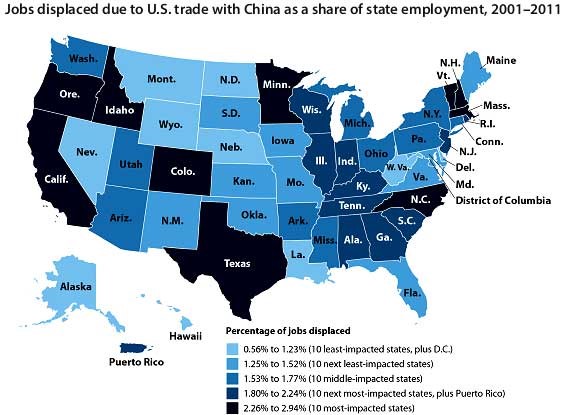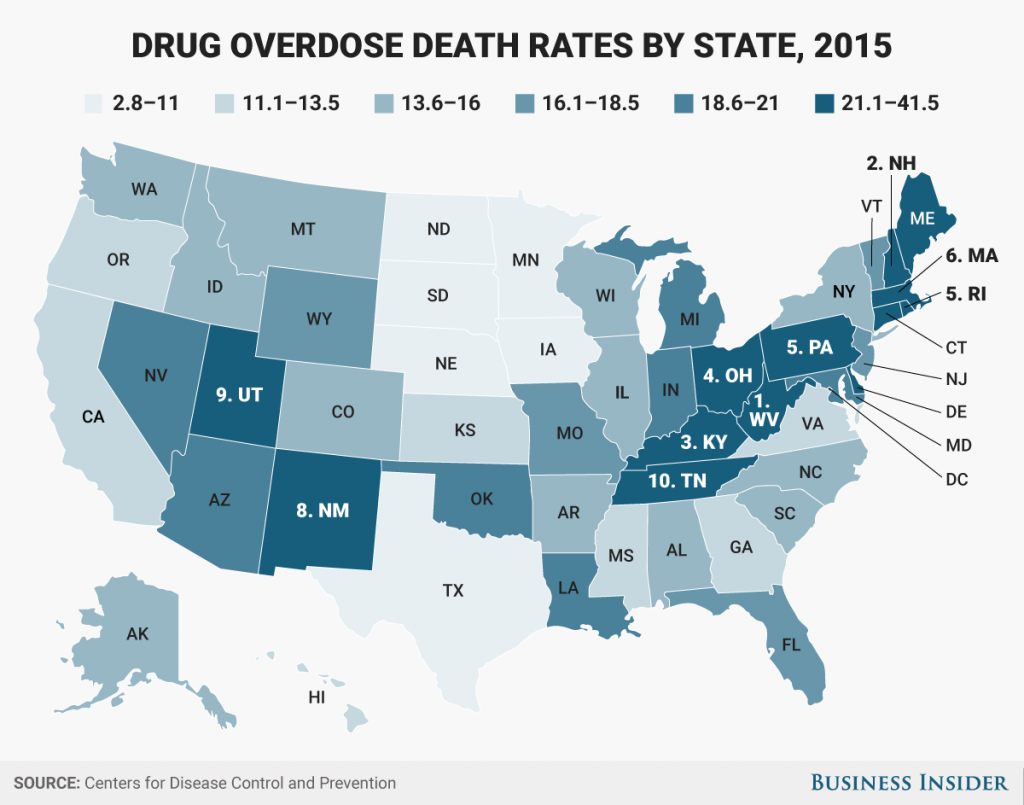A recent White House internal memo has suggested a causal relationship between the decline in manufacturing jobs and a host of social ills, including the opioid epidemic. Here is a graphical/geographic comparison of two variables that are related to these factors.
Here is the geographic variation in job loss due to trade competition from China:

Source: EPI via Oak (2012).
Here is the geographic variation in drug deaths in 2015:

source: Jacobs (2017).
The correlation is less than perfect, from my casual inspection. It should be noted that the influential academic findings have documented a rise in mortality among white non-Hispanic working class individuals, not overall populations, as in the second figure. Still, this lack of correlation suggests that the link between manufacturing job loss (as opposed to overall unemployment level) and drug deaths needs to be further substantiated before acceptance.
More discussion at Yglesias/Vox.
I’d be more interested to see an overlap of opioids with disability payments.
Btw, the 60 Minutes piece on the opioid crisis from the past Sunday is a must see. There is a good bit left out (ie, why the legislation disempowering the DEA passed virtually without opposition from the House, Senate and the Obama administration), but it is really a chilling study of how bad public policy can kill people.
I think there is a good chance we will see a protracted govt shutdown come December.
May be worth a post.
https://www.bloomberg.com/news/articles/2017-10-19/congress-rolls-toward-shutdown-fight-over-immigration-obamacare
Hard to discern a pattern over time:
https://www.statnews.com/2017/04/25/opioid-deaths-map/
https://www.sciencedaily.com/releases/2017/08/170807080752.htm
Root causes are difficult to find. Over-prescribing of opioids for pain relief? Shifting from non-opioids to opioids for pain relief? Moving from medical opioids to street-sourced opioids or vice versa?
Perhaps part of the solution is in the legalization of medical marijuana.
https://www.sciencealert.com/93-of-patients-prefer-cannabis-over-opioids-for-managing-their-pain-according-to-new-study
https://www.ncbi.nlm.nih.gov/pmc/articles/PMC5569620/
It might be interesting to track the state-by-state legalization of medical marijuana against the opioid abuse/deaths in those states to see if there has been a relative decline in opioid abuse/deaths after medical marijuana was legalized. On superficial comparison of the map of opioid abuse/deaths from 1999-2015 (first link in this comment), California and Colorado are two examples of that change.
Those aren’t scientific studies. And, there’s nothing conclusive.
It’s interesting the opioid epidemic coincided with the decriminalizion of marijuana.
The U.S. over-consumes drugs compared to the rest of the world.
Bruce Hall,
Thanks for the interesting links. With respect to the first link to the first science article, that is the first time I have seen morphine and codeine referred to as opioids. They are opiates.
I believe the advantage of cannabis is that it does not directly eliminate pain but distracts to the point that patients care less about the pain. The pain information is still there but patients cope better.
The declining life expectancy of middle-aged white (non-hispanic) American males as documented by Deaton and Case is indeed most interesting.
Then there was this number being bandied about that some 40% of opioid addicts were initially prescribed opioids by a doctor. That is interesting too.
I would have expected non-sanctioned opioid use/abuse would be negatively correlated with education but apparently that is not the case.
Will the opioid epidemic call into question the efficacy of the War on Drugs? Probably not.
I found this a rather alarming article about opioid deaths: https://www.newyorker.com/magazine/2017/10/30/faces-of-an-epidemic?mbid=nl_Daily%20102317&CNDID=27163156&spMailingID=12202455&spUserID=MTMzMTgyODIwMzE0S0&spJobID=1262039210&spReportId=MTI2MjAzOTIxMAS2
In just one county around Dayton, Ohio, there were 349 deaths in 2016 versus 42 gun-related deaths in Dayton (don’t have stats for the entire county. I guess you could say that the opioid deaths were “suicides” as opposed to “murder”. Not sure that makes a difference.